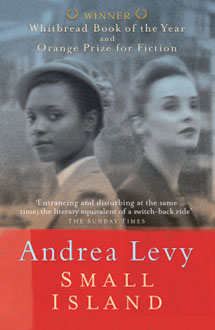Our book group choice for September 2005 is Small Island by Andrea Levy. Hortense Joseph arrives in London from Jamaica in 1948 with her life in her suitcase, her heart broken, her resolve intact. The novel tells the story of four characters who are affected by the Windrush generation of Caribbean immigrants who came to the United Kingdom in the years following World War II.
The novel is told from the alternating perspectives of Hortense Bowden, a Jamaican woman who travels to England to marry a man she has never met; Gilbert Joseph, a Jamaican man who joins the RAF to fight in the war and then immigrates to England; Queenie Baugh, a white English woman who marries a Jamaican man; and Bernard Baugh, Queenie’s husband.
The novel begins in 1948, when Hortense arrives in England on the Empire Windrush, a ship that carried thousands of Caribbean immigrants to the UK. Hortense is full of hope for her new life in England, but she soon finds that she is not welcome. She is subjected to racism and discrimination, and she struggles to find a job and a place to live.
Gilbert also faces racism and discrimination when he arrives in England. He is initially denied a job in the RAF because of his race, but he eventually joins the army. After the war, Gilbert immigrates to England with his friend, Michael. They both struggle to find jobs and a place to live, and they are often treated with hostility by white English people.
Queenie is a young white woman who lives in a small village in England. She is married to Bernard, a Jamaican man who is away fighting in the war. Queenie is initially excited about the prospect of having a Jamaican husband, but she soon finds that she is not prepared for the challenges of living with a black man in a racist society.
Bernard returns from the war a changed man. He is disillusioned by the racism he has experienced, and he is determined to fight for the rights of black people in England. He and Queenie have a difficult time adjusting to married life, and they are often at odds over their different views on race.
The four characters in Small Island are all struggling to find their place in a new world. They are all affected by the racism and discrimination that they face, but they also find strength and resilience in each other. The novel is a powerful and moving story about the immigrant experience, and it is a testament to the human spirit.
Discussion Questions
- What similarities are there between the upbringing and aspirations of Hortense and Queenie? What disappointments do they share? How do their responses to the character of Michael compare?
- What similarities are there between Gilbert and Bernard’s wartime experiences? What changes do they see when they each return home?
- How is Hortense’s relationship to Alberta and Miss Jewell depicted?
- How do you as a reader respond to Hortense’s criticism of the Anderson family and her treatment of her friend Celia Langley?
- How are the attitudes of the US and British armed forces to black people portrayed? What are the differences and similarities?
- Gilbert says that ‘Queenie’s good intentions were entirely missing the point’ during the incident with the GIs in the cinema. What does he mean by this?
- Why does Gilbert want to impress Celia Langley? Why does he then allow himself to be ‘bought’ by Hortense?
- Why do you think Queenie changes from ‘that pretty blonde woman who friendly leaned across a table to share a rock bun’ to the exploitative landlady complaining about her lodgers’ noise and smells? To what extent do you think she was aware of the change that took place in her?
- What effect does the war have upon Queenie? How does it change her relationship with Bernard’s father?
- What vision of the empire do we get through Bernard’s narration? How have his experiences in India shaped his view of immigrants?
- What techniques does Andrea Levy use to distinguish the voices of her four narrators? How reliable are their interpretations of the events described?
- Were you convinced by Levy’s connections and coincidences that link the four main characters? How important is it that the plot twists and revelations are plausible?
- Would you describe Small Island as a political book? Why?

